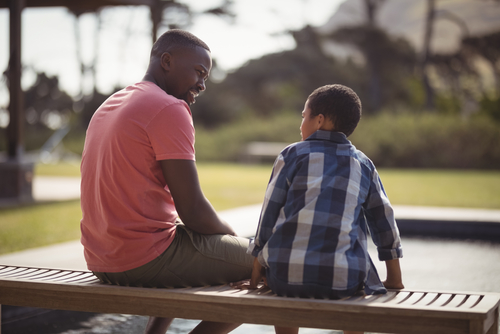Take Some Time To Talk Mental Health With Kids This Summer
updated on Jul 24, 2018

With the holidays in full swing, weeks of free time along with time spent with friends and family ahead, now is the perfect time to start a conversation about mental health
No matter their age, the likelihood is kids have had a busy end of term. For older children, the move onto secondary school is looming just around the corner, while teens face increasing numbers of exams, social pressures, along with big moves to college or sixth form, university, getting their first job or finding an internship.
With increasing worries that high stakes testing may endanger children’s mental health and recent research suggesting as many as 70% of 16 year olds are feelig sad or anxious at least once a week, it’s no wonder the recent announcement that mental health education will be required across all schools from September 2020 recieved a positive reception.
Whether we realise it or not, the summer holidays aren’t neccisarily a break from the stress. For many young people, summer signals pressure: the long lead-up to more change, more pressure, and more challenges. Rather than putting off tough conversations until the new term kicks in or new worries rise, take this time to start the conversation about mental health.

We spoke to Jo Loughran, Director of mental health charity Time to Change about how parents, relatives and family friends can start an open, honest conversation with children and teens about their wellbeing, how we can all and what we can do to start opening up conversations about mental health this summer.
“When one in 10 young people experience a mental health problem before the age of 16, it’s important to be in your child’s corner – supporting them when they need it.” Jo said.
“Talking about mental health breaks down taboos. The more open we are, the more we enable young people to look after their own mental health, reduce the stigma around asking for help, and help them to support their peers.
“If you’re feeling unsure about broaching the topic with your son or daughter, remember one of the most significant things for young people is that they know they can come to talk to you if they are worried about their mental health.
“Talking about it doesn’t need to be difficult or scary and you don’t need to be an expert, simply being open to talking about mental health can make a huge difference.”
Jo’s tips for talking to kids about mental health
-
Listening is key
Listening can be more important and significant than talking. If you’re worried you may be listening without really hearing what your kids have to say, try these tips on how to listen better to discover tips on how to really get them to open up. -
Keep it small and informal
You don’t have to set aside hours for a chat. Try broaching the topic in an informal setting like in the car, over a meal, or while watching TV together. By keeping things informal and relaxed, children can feel more comfortable talking about what can seem like a scary subject and may be more likely to open up. -
Put it in context
We all have mental health, just like we all have physical health. Mental wellbeing doesn’t have to mean feeling happy all the time. Mental health problems are common; with one in four of us experiencing mental ill health at some point in our lives and one in 10 experiencing ill mental health before the age of 16, it’s important to let kids know that these experiences aren’t abnormal.
If we don’t experience mental ill health ourselves, someone we know may have. Let them know it’s OK to ask questions, to talk, and to start open, honest discussions whether we’re worried about something specifically or just want to know more.

While some people find it easier to talk about hypothetical situations, others may be more comfortable talking about their own mental health experiences. It’s just as important for you to feel comfortable talking about mental health as it is for your child or teen to feel comfortable bringing up the topic themselves.
If you aren’t quite sure where to start, try open ended questions or hypothetical situations rather than direct questions about their feelings. Like saying ‘Exams can be really stressful, can’t they?’ or chatting about the experiences of a film or TV character. If you do feel comfortable, being open about your own mental health can help show young people it’s ok to discuss anything that is concerning them – big or small – as part of an open, honest discussion.
Remember: talking about mental health doesn’t make it any more likely for young people to experience the problems or issues discussed. By being open and honest, we can show children and teens it’s ok to talk while helping them feel more comfortable seeking help sooner.
Discover more about Time to Change and how you can support your child with their mental health.

